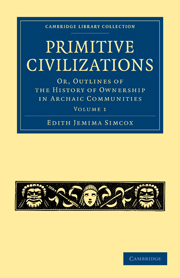Book contents
- Frontmatter
- PREFACE
- Contents
- CHAPTER 1 INTRODUCTION
- CHAPTER II PREHISTORIC PROBLEMS
- BOOK I OWNERSHIP IN EGYPT
- BOOK II ANCIENT BABYLONIA
- CHAPTER I SUMERIAN CIVILIZATION
- CHAPTER II BABYLONIAN CHRONOLOGY
- CHAPTER III THE ANCIENT CITIES OF SUMER AND AKKAD
- CHAPTER IV BABYLONIA AND ASSYRIA
- CHAPTER V COMMERCIAL LAW AND CONTRACT TABLETS
- CHAPTER VII DOMESTIC RELATIONS AND FAMILY LAW
- BOOK III FROM MASSALIA TO MALABAR
CHAPTER V - COMMERCIAL LAW AND CONTRACT TABLETS
Published online by Cambridge University Press: 07 September 2011
- Frontmatter
- PREFACE
- Contents
- CHAPTER 1 INTRODUCTION
- CHAPTER II PREHISTORIC PROBLEMS
- BOOK I OWNERSHIP IN EGYPT
- BOOK II ANCIENT BABYLONIA
- CHAPTER I SUMERIAN CIVILIZATION
- CHAPTER II BABYLONIAN CHRONOLOGY
- CHAPTER III THE ANCIENT CITIES OF SUMER AND AKKAD
- CHAPTER IV BABYLONIA AND ASSYRIA
- CHAPTER V COMMERCIAL LAW AND CONTRACT TABLETS
- CHAPTER VII DOMESTIC RELATIONS AND FAMILY LAW
- BOOK III FROM MASSALIA TO MALABAR
Summary
GENERAL FEATURES.
It is in the development of trade, and especially of banking, rather than in manufactures, that Babylonia and Chaldæa were in advance of all the rest of the world. The most cautious Assyriologists are the least confident in their renderings of the numerous contract tablets from which, if they were accurately interpreted, we should certainly be able to reconstruct the laws and usages of the world's first great market place. There are two schools of interpretation, each deserving of respect and gratitude, which are nowhere more strenuously opposed to each other than in the treatment of these interesting and enigmatic documents. There are German scholars who will not allow that a text has been interpreted unless it has been parsed and the grammar of it explained—or perhaps corrected. And there are French scholars who have happy intuitions of the meaning of a sentence in which some of the words and most of the grammar are unknown. The one school may add to our materials a little faster than is safe, and the other a little more slowly than is necessary. But the impartial critic will admit that both are right in principle.
If a comparative philologist of forty and a child of five are pitchforked into a foreign country, it is probable that the child will be the first to understand and make itself understood, unless the philologist has the linguistic instinct, which is something quite different from a sound judgment as to the value of phonetic and grammatical forms.
- Type
- Chapter
- Information
- Primitive CivilizationsOr, Outlines of the History of Ownership in Archaic Communities, pp. 320 - 359Publisher: Cambridge University PressPrint publication year: 2010First published in: 1894



